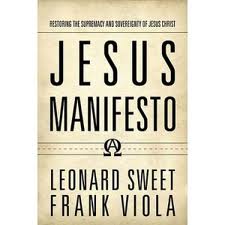N.B. I have known Len Sweet for years, and though I have never met Frank Viola in person (unless we are talking about the one who used to pitch for the Red Sox), he and I have corresponded a lot over the years. Though I have some disagreements with Frank which have already been discussed on this blog, in this book the focus on the recovery of the centrality of Christ in Christian worship and church life is a much needed emphasis which this book rightly brings to the fore. BW3
Ben: Why did you and Leonard write the book? Give us the storyline
behind it.
Frank: For years, Len and I have both
shared a burden and concern that Jesus has been getting short-changed. Right or
wrong, we have felt that He has all-too often been eclipsed by other “hot”
topics and subjects.
It’s rather easy for any of us to get excited about and
major in things that are related to Jesus,
while Christ Himself gets left out in the cold. Jesus becomes a mere footnote,
a slogan, a logo, or a stamp of approval to some other religious or spiritual
pursuit. (Elsewhere I rehearse my own journey of
chasing spiritual “things” instead of the Lord Jesus Himself.) So we felt burdened
to do a project together that would not only give Christ His rightful place . .
. that would not only exalt Him beyond the stratosphere . . . but that would
also unveil His breathtaking Person in ways that would re-introduce Him in a
powerfully fresh way, encouraging people to hunger and thirst for Him and Him
alone. We realized that this was a monumental task that was beyond our capacities,
but we felt God put it on our hearts. The content of the book first appeared as
a short 2,400-word online tract last year. It later developed into a 200-page
book which released in June.
In short, Jesus
Manifesto seeks to bring together the teachings of Jesus on the kingdom of
God, the earthly ministry of Jesus, the atoning work of Jesus, and the Person
of Christ into one enormous whole in the context of knowing Christ today as our
indwelling Lord as Galatians 2, Colossians 1, and Romans 8 describe. The book
is not just a reminder that Jesus Christ is supreme and the very substance of
our faith, but it’s an attempt to re-present His stunning greatness in such way
that our hearts are captured by Him, through Him, and to Him.
Myron Augsburger, the former president of Eastern
Mennonite Seminary, once said:
“I believe in justice: but I am
not a preacher of the gospel of justice, but the Gospel of Christ who calls us
to justice. I believe in love, but I am not a preacher of the gospel of
love, but the Gospel of Christ who calls us to love. I am committed to
peace, but I am not a preacher of the gospel of peace, but the Gospel of Christ
who calls us to peace. I believe in the value of the simple life, but I am
not the preacher of the simple life, but of the Gospel of Christ that calls us
to the simple life. Let us beware of the ultimate plagiarism of borrowing
some great concepts from Jesus then running off proclaiming these concepts and
not sharing the Christ that empowers these concepts.”
Those words sum up the message of the book pretty well.
Ben: What do you hope will be accomplished by it?
Frank: Our hope is
that the Spirit of
God would take the message of the book and press it upon the hearts of every
reader, bringing us all to our faces in the presence of so great a Christ. That
we would make Christ and Christ alone our chief pursuit, our chief love, our
chief passion, and our chief obsession. That God would heal us all of the “Jesus
Deficit Disorder” that plagues so many believers today. Len and I wept as we
wrote various parts of the book and read one another’s parts. So we desire for
others to be touched the same way.
In C.S. Lewis’ Prince Caspian, Aslan
tells Lucy, “Every year you grow, you
will find Me bigger.” This was one of our aims in writing the book – to
present to our hearts a greater view of Christ. Thus our words in the final
pages: “It is with a burning heart for
Jesus Christ and a guarded jealousy for His preeminence that we have written
this book. We have written it for Him and to Him. We trust that it has been by
Him and through Him.”
Ben: What
have the reader reactions been so far?
Frank: The vast majority of people who have
written to us have said all-too kind things about it. Those interested can read
some of the letters and reviews we’ve received from people who were touched and
helped by it, as well as endorsements
by Christian leaders who resonated with the message. For us, they are
hugely humbling.
The main criticism has come from those who felt we
didn’t go into anything practical. There are no “how to steps” in the book.
This is a valid criticism actually, because (right or wrong) we deliberately did not want the work to be a recipe book.
So we steered away from “add water and stir” language or steps. We felt that
this would draw attention away from the very message we were seeking to communicate.
Antoine de
Saint-Exupéry said it best when he wrote, “If
you want to build a ship, don’t herd people together to collect wood and don’t
assign them tasks and work, but rather teach them to long for the endless
immensity of the sea.”
These words
explain quite well what we were attempting to do in the book. We wanted to
present the Lord in such a way that readers would be smitten by the sight of
His glory and long for Him. Or to put it in the words of two songs that we
quote in the book:
What has stript the seeming beauty
From the idols of the earth?
Not a sense of right or duty,
But the sight of peerless worth.
The look that melted Peter
The face that Stephen saw
The heart that wept with Mary
Can alone from idols draw
And
. . .
Turn your eyes upon Jesus,
Look full in His wonderful face,
And the things of earth will grow
strangely dim,
In the light of His glory and grace.
Despite
our shortcomings and limitations, Len and I wrote Jesus Manifesto to stir the hearts of God’s people with the sight
of peerless worth–the very sighting that has deeply moved our own hearts. We
believe that out of this will flow everything else.
BW: What
was it like writing this book with Len and who wrote which parts?
Frank: While our writing styles are different, Len
and I have one thing in common that made the collaboration particularly enjoyable.
We both make heavy use of metaphor in our writing. Among other things, Len is
largely known for inventing new terms and using a single metaphor to describe a
particular idea.
My writing is often peppered
with word pictures that are intended to create images in the reader’s mind. I
like to paint with words. So both of us had fun smithing word images together. For
this reason, each chapter of the book is built around a single metaphor that
serves as an image depicting some aspect of the glories of Christ.
If I can use a music
metaphor, writing the book was like composing an album together,
hammering out each of our tracks on the anvil of Scripture and the English
language. As we edited each other’s chapters, we sought to enhance what the
other person was attempting to communicate. “Writing chemistry” was present,
and instead of dragging one another down, we helped bring out the best in one
another’s writing.
Some have observed that
the book falls into the literature category,
since it meshes escalating prose and poetic rhythms. It tries to communicate to
both left and right brains simultaneously. But more, we seek to direct the
message to a person’s heart and spirit. We want people reading it to be stirred
in their hearts rather than just nodding with their heads. So it blends elements
of devotional literature, teaching, and challenge.
As
to who wrote what, here’s the breakdown (I’m continuing the music metaphor):
Introduction and Chapter 10: Len
sings one half and I sing the other half.
Chapters 1,2,3,8,9: I sing lead
and Len sings harmony; he also sings a few solo stanzas here and there.
Chapters 4,5,6,7: Len sings lead
and I sing harmony; I also sing a few solo stanzas here and there.
Afterword: Paul of Tarsus sings with some
minor tweaking to the lyrics.
Readers can
learn more here, if they are interested: www.theJesusManifesto.com
Thank you
for this interview, Ben. I really appreciate your contribution to the body of
Christ.


